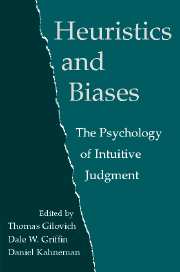Book contents
- Frontmatter
- Contents
- List of Contributors
- Preface
- Introduction – Heuristics and Biases: Then and Now
- PART ONE THEORETICAL AND EMPIRICAL EXTENSIONS
- PART TWO NEW THEORETICAL DIRECTIONS
- PART THREE REAL-WORLD APPLICATIONS
- 33 The Hot Hand in Basketball: On the Misperception of Random Sequences
- 34 Like Goes with Like: The Role of Representativeness in Erroneous and Pseudo-Scientific Beliefs
- 35 When Less Is More: Counterfactual Thinking and Satisfaction among Olympic Medalists
- 36 Understanding Misunderstanding: Social Psychological Perspectives
- 37 Assessing Uncertainty in Physical Constants
- 38 Do Analysts Overreact?
- 39 The Calibration of Expert Judgment: Heuristics and Biases Beyond the Laboratory
- 40 Clinical versus Actuarial Judgment
- 41 Heuristics and Biases in Application
- 42 Theory-Driven Reasoning about Plausible Pasts and Probable Futures in World Politics
- References
- Index
40 - Clinical versus Actuarial Judgment
from PART THREE - REAL-WORLD APPLICATIONS
Published online by Cambridge University Press: 05 June 2012
- Frontmatter
- Contents
- List of Contributors
- Preface
- Introduction – Heuristics and Biases: Then and Now
- PART ONE THEORETICAL AND EMPIRICAL EXTENSIONS
- PART TWO NEW THEORETICAL DIRECTIONS
- PART THREE REAL-WORLD APPLICATIONS
- 33 The Hot Hand in Basketball: On the Misperception of Random Sequences
- 34 Like Goes with Like: The Role of Representativeness in Erroneous and Pseudo-Scientific Beliefs
- 35 When Less Is More: Counterfactual Thinking and Satisfaction among Olympic Medalists
- 36 Understanding Misunderstanding: Social Psychological Perspectives
- 37 Assessing Uncertainty in Physical Constants
- 38 Do Analysts Overreact?
- 39 The Calibration of Expert Judgment: Heuristics and Biases Beyond the Laboratory
- 40 Clinical versus Actuarial Judgment
- 41 Heuristics and Biases in Application
- 42 Theory-Driven Reasoning about Plausible Pasts and Probable Futures in World Politics
- References
- Index
Summary
A psychiatric patient displays ambiguous symptoms. Is this a condition best treated by psychotherapy alone or might it also require an antipsychotic medication with occasionally dangerous side effects? An elderly patient complains of memory loss but neurological examination and diagnostic studies are equivocal. The neuropsychologist is asked to administer tests to help rule out progressive brain disease. A medical work-up confirms a patient's worst fears: He has terminal cancer. He asks the doctor how long he has to put his life in order.
These three brief scenarios illustrate a few of the many situations in which experts are consulted to diagnose conditions or to predict human outcomes. Optimal planning and care often hinge on the consultant's judgmental accuracy. Whether as physicians, psychiatrists, or psychologists, consultants perform two basic functions in decision-making: they collect and interpret data. Our interest here is in the interpretive function, specifically the relative merits of clinical versus actuarial methods.
METHODS OF JUDGMENT AND MEANS OF COMPARISON
In the clinical method the decision-maker combines or processes information in his or her head. In the actuarial or statistical method the human judge is eliminated and conclusions rest solely on empirically established relations between data and the condition or event of interest. A life insurance agent uses the clinical method if data on risk factors are combined through personal judgment. The agent uses the actuarial method if data are entered into a formula, or tables and charts that contain empirical information relating these background data to life expectancy.
- Type
- Chapter
- Information
- Heuristics and BiasesThe Psychology of Intuitive Judgment, pp. 716 - 729Publisher: Cambridge University PressPrint publication year: 2002
- 41
- Cited by



